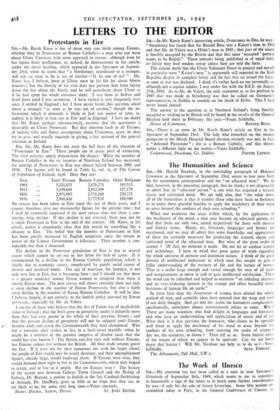LETTERS TO THE EDITOR
Protestants in Eire
Rawle Knox is one of those very rare birds among Eireans, whether they be Protestants or Roman Catholics—a man who can write about Ulster Unionists with some approach to reason: although even he has lapses from intelligence, as, indeed, he demonstrates in the article, under the above heading, which appeared in the Spectator of Septem- ber 23rd, when he states that " a Northerner, introduced to a stranger, will ask—as soon as he is out of earshot—` Is he one of us?' " Mr. Knox has, I believe, been in Ulster once in his life for about fifteen minutes ; but the brevity of his visit does not prevent him from laying down the law about the North, and he will pontificate about Ulster as if he had spent his whole existence there. I was born in Belfast and lived there until I was seventeen. I have visited it very frequently ever since I settled in England ; but I have never heard this question asked about a stranger "as soon as he was out of earshot," though the in- formation which it demands is likely to leak out sooner or later, as, indeed, it is likely to leak out in Eire and in England. I have no doubt that Mr. Knox, perhaps subconsciously, assumes that the questioner is invariably an Ulster Protestant. But that inherent fault in all Eireans, of making false and flimsy assumptions about Ulstermen, apart, he does try to give, and usually succeeds in giving, a fair account of the general situation in Ireland.
But, Sir, Mr. Knox does not state the full facts of the situation of " Protestants in Eire." These people are in grave peril of extinction. The vital statistics amply demonstrate the danger. While the number of Roman Catholics in the six counties of Northern Ireland has increased, the number of Protestants in Eire was almost halved between 1901 and 1936. The figures will be found in Table la, vol. iii, of The Census of Population of Ireland, 1936. Here they are: Year
Total Persons Roman Catholics Other Religions 1901
3,221,823 2,878,271 343,552 1911 ••• 3,139,688 2,812,509 327,179 1926
2,971,992 2,751,269 220,723 - 1936
2,968,420 2,773,920 194,500 No census has been taken in Eire since the last of these years, and I cannot, therefore, give any trustworthy figures for the present time ; but I "shall be extremely surprised if the next census does not show a con- tinuing steep decline. If this decline is not arrested, there may not be a single Protestant in Eire at the end of the century. Mr. Knox, in his article, makes it abundantly clear that this would be something like a disaster to Eire. The belief that the number of Protestants in Eire has been greatly increased by English emigrants since the return to power of the Labour Government is fallacious. Their number is con- siderably less than a thousand.
The decline in the Protestant population of Eire is due to several causes which cannot be set out in this letter for lack of space. It is accompanied by a decline in the Roman Catholic population, which is chiefly due to economic causes, complicated by purely social causes of diverse and involved kinds. The age of marriage, for instance, is not only very late in Eire, but is becoming later ; and I should say that there is a greater tendency among Eirean women to emigrate than there is among Eirean men. The next census will almost certainly show not only a steep decline in the number of Eirean Protestants, but also a fairly steep decline in the number of Eirean Roman Catholics. It will be due, I believe, largely, if not entirely, to the foolish policy pursued by Eirean politicians, especially by Mr. dc Valera.
I am one of those who believe that the Act of Union was of incalculable value to Ireland ; that the Irish grew in prosperity under it infinitely more than they had ever grown in the whole of their previous history ; and that the present decline of prosperity will not be snipped until Eireans, become adult and rejoin the Commonwealth they have abandoned. Who but a romantic idiot wishes to live in a back-street republic when he might be a member of the greatest congress of diverse races that the world has ever known ? The British can live very well without Eireans, but Eireans cannot live without the British. All their trade returns prove the fact. If it were not for their numerous ties with the larger island, the people of Eire would now be nearly destitute, and their unemployment figures, already large, would bankrupt them. If Eireans were wise, they would demand their right to live in the Commonwealth, which they helped to create, and to live in it amply. But are Eireans wise ? The history of the recent row between Galway Town Council and the Bishop of Galway, Dr. Browne, a prelate as foolish as the late Cardinal-Archbishop of Armagh, Dr. MacRory, gives us little or no hope that they are, or are likely to be, for some very long time.—Yours sincerely,














































 Previous page
Previous page